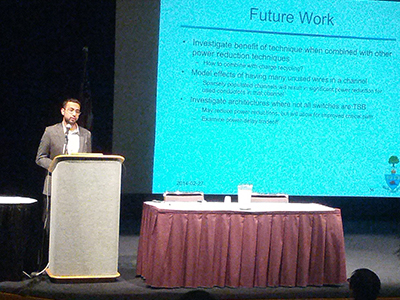
March 6, 2014
PhD candidate Safeen Huda and Professor Jason Anderson of The Edward S. Rogers Sr. Department of Electrical & Computer Engineering won the Best Paper Award at FPGA 2014, the 22nd ACM/SIGDA International Symposium on Field-Programmable Gate Arrays. The conference only confers one award each event, making this a particularly significant accomplishment for the pair.
“Winning a best paper award at a major conference at some point in my career has always been a goal that I’ve had,” said Huda. “I’m very honoured and humbled to have achieved that goal.”
FPGAs are chips whose function can be programmed by the end-user. Because of their reconfigurability, FPGAs are known to consume more power than chips with a single dedicated function. Huda and Professor Anderson’s paper, titled “Optimizing Effective Interconnect Capacitance for FPGA Power Reduction”, describes new methods for reducing the programmable chips’ consumption—reductions that could allow FPGAs to be incorporated into consumer electronics such as mobile devices.
“FPGAs have historically not been used in mobile devices, and now they’re starting to be,” said Professor Anderson. “Research on the power front is needed if this technology is to be more widely used in mobile.”
This research was partly funded by Fujitsu Laboratories Limited in Kawasaki, Japan. Huda and Professor Anderson would like to concentrate future research on examining how their technique performs when combined with other power-reduction strategies.
The ACM/SIGDA International Symposium on Field Programmable Gate Arrays is one of the premier conferences in the field. This year’s event was held in Monterey, California from February 22-26, and was chaired by ECE Professor Vaughn Betz. Professor Anderson served as publicity chair.
More information:
Marit Mitchell
Senior Communications Officer
The Edward S. Rogers Sr. Department of Electrical & Computer Engineering
416-978-7997; marit.mitchell@utoronto.ca